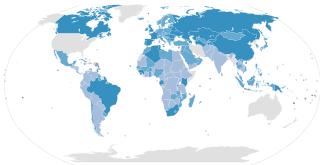Labour laws, labour code or employment laws are those that mediate the relationship between workers, employing entities, trade unions, and the government. Collective labour law relates to the tripartite relationship between employee, employer, and union.

Home care is supportive care provided in the home. Care may be provided by licensed healthcare professionals who provide medical treatment needs or by professional caregivers who provide daily assistance to ensure the activities of daily living (ADLs) are met. In-home medical care is often and more accurately referred to as home health care or formal care. Home health care is different non-medical care, custodial care, or private-duty care which refers to assistance and services provided by persons who are not nurses, doctors, or other licensed medical personnel. For patients recovering from surgery or illness, home care may include rehabilitative therapies. For terminally ill patients, home care may include hospice care.
Overtime is the amount of time someone works beyond normal working hours. The term is also used for the pay received for this time. Normal hours may be determined in several ways:

United Kingdom labour law regulates the relations between workers, employers and trade unions. People at work in the UK can rely upon a minimum set of employment rights, which are found in Acts of Parliament, Regulations, common law and equity. This includes the right to a minimum wage of £10.42 for over-23-year-olds from April 2023 under the National Minimum Wage Act 1998. The Working Time Regulations 1998 give the right to 28 days paid holidays, breaks from work, and attempt to limit long working hours. The Employment Rights Act 1996 gives the right to leave for child care, and the right to request flexible working patterns. The Pensions Act 2008 gives the right to be automatically enrolled in a basic occupational pension, whose funds must be protected according to the Pensions Act 1995.

Child labor laws in the United States address issues related to the employment and welfare of working children in the United States. The most sweeping federal law that restricts the employment and abuse of child workers is the Fair Labor Standards Act of 1938 (FLSA), which came into force during the Franklin D. Roosevelt administration. Child labor provisions under FLSA are designed to protect the educational opportunities of youth and prohibit their employment in jobs that are detrimental to their health and safety. FLSA restricts the hours that youth under 16 years of age can work and lists hazardous occupations too dangerous for young workers to perform.

The rights and duties for employees, labor unions, and employers are set by labor law in the United States. Labor law's basic aim is to remedy the "inequality of bargaining power" between employees and employers, especially employers "organized in the corporate or other forms of ownership association". Over the 20th century, federal law created minimum social and economic rights, and encouraged state laws to go beyond the minimum to favor employees. The Fair Labor Standards Act of 1938 requires a federal minimum wage, currently $7.25 but higher in 29 states and D.C., and discourages working weeks over 40 hours through time-and-a-half overtime pay. There are no federal laws, and few state laws, requiring paid holidays or paid family leave. The Family and Medical Leave Act of 1993 creates a limited right to 12 weeks of unpaid leave in larger employers. There is no automatic right to an occupational pension beyond federally guaranteed Social Security, but the Employee Retirement Income Security Act of 1974 requires standards of prudent management and good governance if employers agree to provide pensions, health plans or other benefits. The Occupational Safety and Health Act of 1970 requires employees have a safe system of work.
United States v. Darby Lumber Co., 312 U.S. 100 (1941), was a case in which the United States Supreme Court upheld the Fair Labor Standards Act of 1938, holding that the U.S. Congress had the power under the Commerce Clause to regulate employment conditions. The unanimous decision of the Court in this case overturned Hammer v. Dagenhart, 247 U.S. 251 (1918), limited the application of Carter v. Carter Coal Company, 298 U.S. 238 (1936), and confirmed the underlying legality of minimum wages held in West Coast Hotel Co. v. Parrish, 300 U.S. 379 (1937).

Ex parte H.V. McKay, commonly referred to as the Harvester case, is a landmark Australian labour law decision of the Commonwealth Court of Conciliation and Arbitration. The case arose under the Excise Tariff Act 1906 which imposed an excise duty on goods manufactured in Australia, £6 in the case of a stripper harvester, however if a manufacturer paid "fair and reasonable" wages to its employees, it was excused from paying the excise duty. The Court therefore had to consider what was a "fair and reasonable" wage for the purpose of the act.

The legal working age is the minimum age required by law in each country or jurisdiction for a young person who has not yet reached the age of majority to be allowed to work. Activities that are dangerous, harmful to the health or that may affect the morals or well-being of minors fall into this category.
The term sheltered workshop refers to an organization or environment that employs people with disabilities separately from others, usually with exemptions from labor standards, including but not limited to the absence of minimum wage requirements.

The Fair Minimum Wage Act of 2007 is a US Act of Congress that amended the Fair Labor Standards Act of 1938 to gradually raise the federal minimum wage from $5.15 per hour to $7.25 per hour. It was signed into law on May 25, 2007 as part of the U.S. Troop Readiness, Veterans' Care, Katrina Recovery, and Iraq Accountability Appropriations Act, 2007. The act raised the federal minimum wage in 3 increments: to $5.85 per hour 60 days after enactment, to $6.55 per hour a year later, and finally to $7.25 per hour two years later. In addition, the act provided for the Northern Mariana Islands and American Samoa to make the transition to the federal minimum wage on alternate timetables.
Minimum wage law is the body of law which prohibits employers from hiring employees or workers for less than a given hourly, daily or monthly minimum wage. More than 90% of all countries have some kind of minimum wage legislation.
Auer v. Robbins, 519 U.S. 452 (1997), is a United States Supreme Court case that concerns the standard that the Court should apply when it reviews an executive department's interpretation of regulations established under federal legislation. The specific issue was whether sergeants and lieutenants in the St. Louis Police Department should be paid for working overtime. The Fair Labor Standards Act of 1938 established the overtime pay requirement, and the US Department of Labor issued regulations to determine if an employee was covered by the overtime requirement.

In the United States, the minimum wage is set by U.S. labor law and a range of state and local laws. The first federal minimum wage was instituted in the National Industrial Recovery Act of 1933, signed into law by President Franklin D. Roosevelt, but later found to be unconstitutional. In 1938, the Fair Labor Standards Act established it at 25¢ an hour. Its purchasing power peaked in 1968, at $1.60 In 2009, it was increased to $7.25 per hour, and has not been increased since.
The New York State Department of Labor is the department of the New York state government that enforces labor law and administers unemployment benefits.

The Fair Labor Standards Act of 1938 29 U.S.C. § 203 (FLSA) is a United States labor law that creates the right to a minimum wage, and "time-and-a-half" overtime pay when people work over forty hours a week. It also prohibits employment of minors in "oppressive child labor". It applies to employees engaged in interstate commerce or employed by an enterprise engaged in commerce or in the production of goods for commerce, unless the employer can claim an exemption from coverage. The Act was enacted by the 75th Congress and signed into law by President Franklin D. Roosevelt in 1938.
Garcia v. San Antonio Metropolitan Transit Authority, 469 U.S. 528 (1985), is a landmark United States Supreme Court decision in which the Court held that the Congress has the power under the Commerce Clause of the Constitution to extend the Fair Labor Standards Act, which requires that employers provide minimum wage and overtime pay to their employees, to state and local governments. In this case, the Court overruled its previous decision in National League of Cities v. Usery, in which the Court had held that regulation of the activities of state and local governments "in areas of traditional governmental functions" would violate the Tenth Amendment to the United States Constitution.
West Coast Hotel Co. v. Parrish, 300 U.S. 379 (1937), was a decision by the United States Supreme Court upholding the constitutionality of state minimum wage legislation. The court's decision overturned an earlier holding in Adkins v. Children's Hospital (1923) and is generally regarded as having ended the Lochner era, a period in American legal history during which the Supreme Court tended to invalidate legislation aimed at regulating business.
The companionship exemption refers to federal labor regulations in the United States that exclude workers providing companionship services to the elderly or disabled from the federal minimum wage and overtime protections that apply to most other American workers.

Wage theft is the failing to pay wages or provide employee benefits owed to an employee by contract or law. It can be conducted by employers in various ways, among them failing to pay overtime; violating minimum-wage laws; the misclassification of employees as independent contractors; illegal deductions in pay; forcing employees to work "off the clock", not paying annual leave or holiday entitlements, or simply not paying an employee at all.










